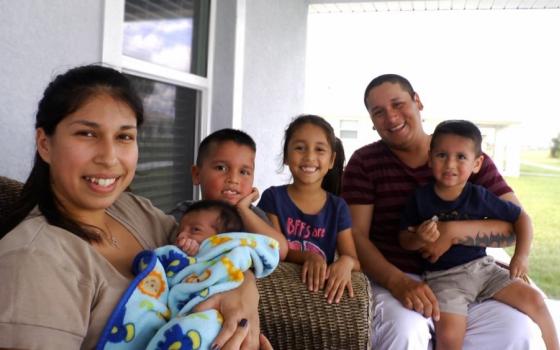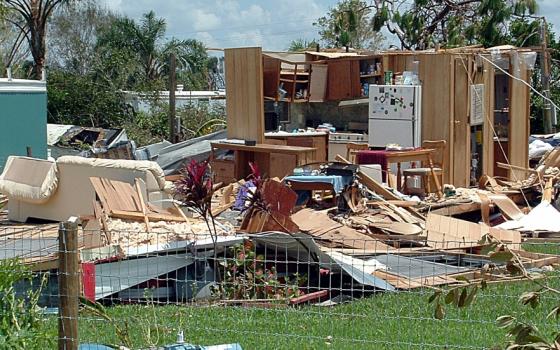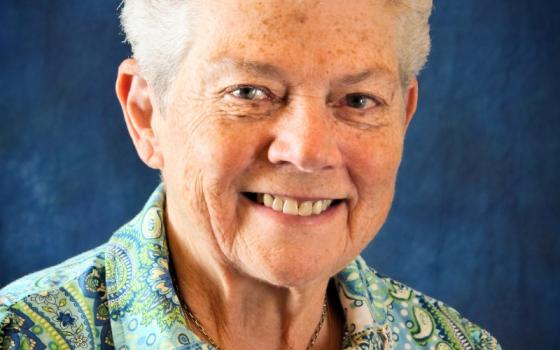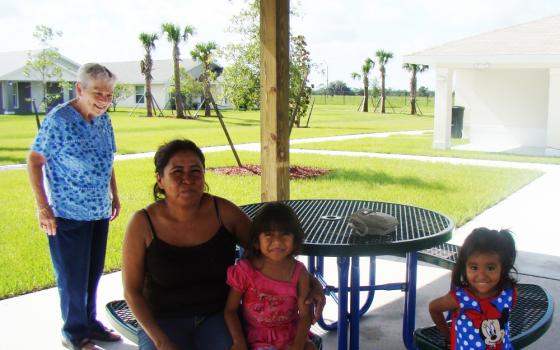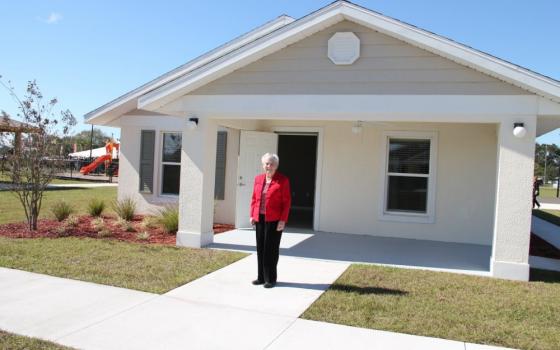Long before the “Francis Effect” there was the “Buster Effect.”
When Hurricane Charley tore through southwest Florida in 2004 it leveled DeSoto County, one of the poorest counties in the state. In the town of Arcadia, farmworkers watched 150 mile-per-hour winds demolish their already flimsy mobile homes and ruin their belongings.
Families doubled up in the remaining trailers, living in crowded, deplorable conditions. Unknown to them at the time, a diminutive, soft spoken Sister of Providence had their backs. Not only was she a woman of God, she was something else they desperately needed: a housing expert.
Sr. Cathy Buster has administered, managed and developed housing projects for 57 years and has 14 different certifications and licenses in housing, training and real estate. Buster, a Sister of Providence of St. Mary-of-the-Woods, Terra Haute, Indiana, is also an expert at partnering and networking – two skills she considers essential to building successful housing projects in Florida.
The petite, energetic 77-year-old has blue eyes that can sparkle with amusement or be steely with resolve. She describes herself as someone who “stays under the radar but is not afraid of a battle.” As her Superior General, Sr. Denise Wilkinson, said: “She can see it before it happens, and she has the vision and drive to make it happen.”
Buster says she first learned “plant management” at home. The middle child of six boys and three girls, she once told her mother she wanted to be “somebody’s maid” when she grew up.
“I saw the need. My sister would practice piano and I would visit the older people and help.”
After years of managing properties for her Indiana congregation, Buster moved to Florida in 1998 to work with the Venice diocese's real estate office; she became the housing consultant for Catholic Charities in the Diocese of Venice in 2010. She saw the hurricane’s devastation firsthand. When the Catholic Charities board of directors decided to address the need for farmworker housing, Buster went into action. She helped set up Casa San Juan Bosco, Inc., a 501(c)(3) corporation formed to provide permanent housing for reliable farmworkers, crucial to the area’s agricultural economy.
Her vision went far beyond bricks and mortar. She dreamed of a new kind of community for farmworkers, one that was healthy, safe and empowering. It would have green spaces for families to gather and children to play and a center where all could learn.
With a project price tag of $10 million, Buster knew they needed partners.
“We call her the ‘Donald Trump of the nuns,’” explained Eugene H. Turner Jr. He and his 96- year-old father, Eugene Turner Sr., are realtors and long-time property owners in Arcadia. They had no experience with Catholic sisters until Buster came into their lives looking for land.
“Sr. Cathy was and is a blessing to the Turner family. She is very tenacious; she absolutely makes it happen,” said Turner, Jr. admiringly.
So tenacious was she that the Turner Family Partnership donated 20 acres of pastureland for the new community.
Buster also needed a quick re-zoning to qualify for a federal grant so she asked the Turners to make that happen, too. As she recalls, Turner, Sr.’s response was, “My God, you want everything. But because you’re persistent and always respectful, we’ll do it.”
The Turner partnership would be the first in a long list of public and private sources that the persistent Buster would help rally to bring the Casa San Juan Bosco project to life. In addition to parishes, diocesan councils of Catholic women, and private and community donors, Catholic Charities partners with Florida Housing Finance Corporation and U.S. Department of Agriculture Rural Development programs for housing loans and grants as well as for subsidized rental assistance.
Peter Routsis-Arroyo, chief operating officer of Catholic Charities for the Venice diocese, remembers the tremendous challenges and obstacles.
“I always felt reassured knowing that Sr. Cathy was not only advocating on behalf of it but also that she was praying to the Lord for it to happen and had her entire community praying with her. Her faith is monumental and allows her to be positive even when everyone else sees the challenge as almost impossible.”
The project took years, spanning the tenures of two bishops. Begun under Bishop Emeritus John J. Nevins it was completed under the current Bishop of Venice, Frank J. Dewane. In 2013 Casa San Juan Bosco welcomed its first farmworker families.
State-of-the-art housing for farmworkers
A mile or so from downtown Arcadia, the sign for Casa San Juan Bosco is hard to miss. Its curved base and large brown letters appear suddenly out of acres of flat pastureland. In this land of tired trailer parks, what sits beyond the sign is even more startling: 53 brand new, pastel-colored single family homes with slanted roofs, all neatly lined up, with front doors facing one another across sidewalk-lined “pocket parks” of grass. As project director, Buster had a role in convincing planners that this design makes it easier for families to interact and build community.
For the first time in their lives, Andrea and Bertin Estrada and their five children have a place of their own. Andrea Estrada told Buster that her children still talk about where they lived before and how much they love the space they have now. When Buster first visited the Estradas, their oldest child, Bertin, blurted out to her, “Lady, we have space. We love space.”
Each Casa home has three or four bedrooms, two baths, a full-sized washer and dryer, ceiling fans and Energy Star appliances in the kitchens.
At Casa there is a children’s playground, a soccer field, a community garden and a transportation hub, where buses arrive to take workers to fields, children to school and families to the stores. Power lines and utilities are underground and houses are built to withstand 200 mile-per-hour winds. The project is now a model of state-of-the-art, energy-efficient farmworker housing.
Casa San Juan Bosco is for the working poor, and to be legally eligible to apply for the rental housing, 50 percent of a family's income has to come from farm work.
Casa San Juan Bosco has a waiting list of over 100 families. At the Mercy Center near the entrance, Catholic Charities staffer Laura Rodriguez leads the after-school program where the community’s children study English and work in the computer lab.
Farmworkers rarely have access to this level of healthy housing, community and education for themselves and their children. The hope is that living in a place like Casa San Juan Bosco will reduce poverty’s stress and sickness and bring new possibilities for multi-generational learning.
For Eugene Turner, Jr., the businessman, there is an added advantage. “This is a wonderful project. It has helped our city and the whole area to clean up. Some of their living conditions were disgraceful.”
'The Buster Effect,’ Phase II
Phase I of Casa San Juan Bosco is up and running, but Sr. Cathy Buster is far from finished. She is working on adding a service kitchen to the community center, to bring in nutrition programs that provide hot meals for children whose parents are working in the fields until sundown.
Expanded capacity is on the horizon. On a recent tour of Phase I, Buster turns toward an adjacent field, future home of Casa San Juan Bosco, Phase II. The $8 million dollar project will build 44 single-family homes in the same energy efficient design as Phase I. She points to the opposite pasture where senior housing will begin in 2016, then to the land near the road where a clinic may go. Farther down the road she sees an ideal spot for a grocery store. Where others only see empty fields, Buster sees houses and facilities for farmworker families
Given her track record, Buster would be justified in taking credit for these hugely successful projects. She doesn’t. Her spirituality and mission are incarnational, rooted in the concrete reality of people’s lives. “It’s all about providing a wonderful place that farmworkers and their children are proud to call home. And, ultimately, it’s all God’s project.”
God, in this case, has a great project director.
Editor's note: An earlier version of this story misidentified the date when Sr. Cathy Buster became vice president for housing with Catholic Charities of the Diocese of Venice.
[Carol Stanton is a former television news anchor and reporter and has served the Diocese of Orlando, Fla., as communications director and director of lay ministry formation.]
